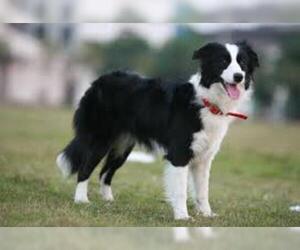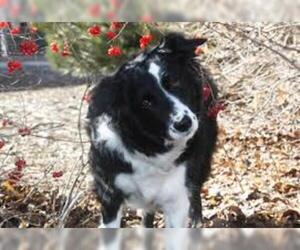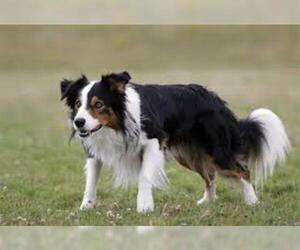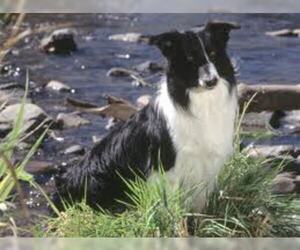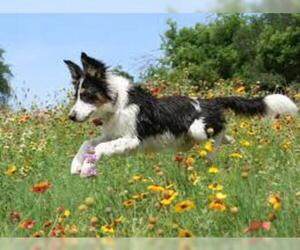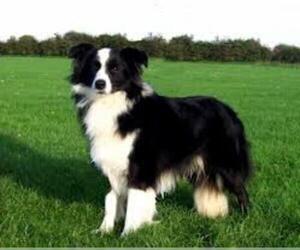
All about Border Collie dog breed
A.K.A. :Scotch Collie, Scottish Sheepdog, Sheepdog, Working Collie, Farmers Dog, The Eye Dog, Heading Dog, Collie, Farm Collie, Shepherd's Dog, Northern British Sheepdog, Scotch Sheepdog, Highland Collie, Lowland Collie, Welsh Sheepdog, Northumbrian Sheepdog, Old Border Collie, English Sheepdog, Working Border Collie, BC
Size
Grooming requirements
Exercise requirements
Good with other dogs
Watchdog ability
Energetic
Training requirements
Playful
Affectionate
Good with other pets
Good with children
Good with strangers
Winter
Summer
Healthiness
Protective
Life Span
| Pure Breeds | Member |
| Breeds A - Z | B |
| Breeds by Group | Herding |
| Breeds by Trait | Fast Dog Breeds High Stamina Dog Breeds Smartest Dog Breeds |
| Overview: | The Border Collie is a highly intelligent and energetic herding dog, originating from the Anglo-Scottish border region where they were bred for their exceptional sheep-gathering abilities. Physically, they are medium-sized dogs with an athletic build, typically weighing between 30-55 pounds, and feature a double coat that can be rough or smooth, appearing in a wide variety of colors, though black and white is most common. Their alert, intense gaze is a hallmark of the breed. Temperamentally, Border Collies are renowned for their incredible trainability, eagerness to please, and boundless energy, making them excellent candidates for dog sports like agility and obedience. However, this high drive means they require significant mental and physical stimulation; without proper outlets, they can become bored and destructive. While loyal and affectionate with their families, their herding instincts can sometimes translate to nipping at children or other pets if not managed, making them generally better suited for experienced owners who can dedicate time to their training and exercise needs. They are definitely not suited for apartment living and thrive in homes with large, secure yards and active lifestyles. Health-wise, they are generally robust, but can be prone to certain genetic conditions such as Collie Eye Anomaly (CEA), hip and elbow dysplasia, and Trapped Neutrophil Syndrome (TNS). |
F.A.Q.
All You Need to Know About the Border Collie Breed
Hailing from the Anglo-Scottish border, the Border Collie is a highly intelligent and energetic herding dog. Renowned for their incredible trainability and keen intellect, they possess a strong work ethic and require a purpose. Physically, they are medium-sized with a double coat (rough or smooth) in various colors, most commonly black and white. Their intense gaze is a hallmark of their breed. While incredibly loyal and affectionate with their families, their high energy levels and need for mental stimulation make them generally unsuitable for apartment living. They thrive in active households with large yards or acreage, requiring extensive daily exercise and engaging activities like agility or obedience. Grooming needs are moderate, with regular brushing to maintain their coat. Potential health concerns include hip and elbow dysplasia, as well as eye conditions like Collie Eye Anomaly (CEA). A Border Collie excels with experienced owners who can provide consistent training and meet their demanding exercise requirements.Border Collie Weight: Average Size & Healthy Weight for Border Collie
The average weight for an adult Border Collie typically ranges from 30 to 55 pounds. While there can be some overlap, male Border Collies tend to be slightly heavier, generally weighing between 35 and 55 pounds. Female Border Collies are usually found in the 30 to 45-pound range. This makes the Border Collie a medium-sized dog, known for its agile and athletic build rather than sheer bulk.Wondering about the Border Collie height? When considering a Border Collie, understanding their typical size is important for potential adopters and buyers. Here’s what you need to know about how tall is a Border Collie on average:
Average Border Collie Height: Clear & Informative
The average height of a Border Collie, measured at the shoulder (withers), typically ranges from 18 to 22 inches.- Males: Generally, male Border Collies tend to be slightly taller, typically falling within the 19 to 22-inch range.
- Females: Female Border Collies are usually a bit smaller, with their height commonly ranging from 18 to 21 inches.
The Border Collie breed boasts a stunning array of Border Collie colors, with the most common and AKC recognized Border Collie colors being black and white. However, this intelligent breed comes in many other striking variations. Accepted by major kennel clubs like the AKC are also black, tri-color (black, white, and tan), sable (various shades of brown with black tipping), red and white (ranging from light gold to deep auburn), and slate (a dilute black, appearing grey). Beyond these, you can find rare Border Collie coat types and exotic Border Collie variations such as blue merle (patches of grey, white, and black), red merle (patches of red, white, and cream), chocolate (various shades of brown), lilac (a dilute chocolate, appearing purplish-grey), blue (a dilute black, appearing grey), brindle (stripes of two colors, often black on a lighter background), fawn (a dilute red, appearing light tan), and cream (a very light, almost white, red). While beautiful, some of these rarer colors and patterns, particularly merle, may be associated with specific health considerations, and potential adopters should research responsible breeding practices. White Border Collies also exist, though extensive white on the head or body can sometimes be linked to hearing or vision issues, making it less desirable in show lines but perfectly acceptable for loving companions. When considering Border Collie colors and pricing, remember that rarer variations may command higher prices, but the most important factor is a healthy, well-socialized puppy from a reputable breeder.
The Border Collie personality is characterized by exceptional intelligence, intense focus, and an eager-to-please disposition. They are highly loyal to their families and can form strong bonds, often displaying a watchful protectiveness. While generally friendly and approachable, their sociability can vary; some are outgoing, while others may be more reserved with strangers until they feel comfortable.Regarding adaptability to apartment living, Border Collies are generally not recommended for apartments due to their high energy levels and strong need for mental and physical stimulation. They thrive in environments with ample space to run and opportunities to engage their minds.With children, well-socialized Border Collies can be wonderful companions, though their herding instincts may lead them to "herd" young children, which should be managed and redirected. Supervision is always recommended. When it comes to other pets, they can generally coexist peacefully, especially if raised with them. However, their herding drive might extend to other animals, and proper introductions and training are crucial to ensure harmony. This temperament of Border Collie requires owners committed to providing consistent training, plenty of exercise, and mental enrichment to prevent boredom and behavioral issues.
The Border Collie temperament is renowned for its high intelligence, intense focus, and boundless energy. They are exceptionally loyal and devoted companion dogs, forming strong bonds with their families. Generally friendly and sociable with people they know, they can be reserved or watchful with strangers, making early socialization crucial.
Their natural herding instinct means they thrive on having a "job" to do and can be prone to "herding" children or other pets if not properly trained and stimulated. Border Collies are not well-suited for apartment living unless their significant exercise and mental stimulation needs are met daily; they require ample space and opportunities to run. With children, they are typically good-natured and patient, especially if raised with them, but supervision is always recommended due to their herding tendencies. They can coexist peacefully with other pets if introduced carefully and socialized from a young age. While eager to please, their intelligence can sometimes manifest as stubbornness if they feel their efforts are not being directed effectively or if they are bored. They are also known for their sensitivity to their owner's tone and mood, responding best to positive reinforcement training methods. Expect a highly trainable, active, and affectionate dog that thrives on engagement and a clear purpose.Border Collie Care: Essential Daily Maintenance & Health TipsCaring for a Border Collie involves understanding their unique needs. This is a low-energy dog breed requiring minimal exercise, making them ideal for apartment living. Daily maintenance is crucial for their well-being.Grooming Needs: Border Collies have a short, smooth coat that requires minimal grooming. Brush them once a week to remove loose hair and keep their coat healthy. Occasional bathing (monthly or as needed) will suffice.Dietary Considerations: Feed your Border Collie a high-quality, balanced diet appropriate for their life stage and activity level. Since they are prone to weight gain, weight management is essential. Avoid overfeeding and limit treats. Consult your vet for specific dietary recommendations.Common Health Concerns:* Skin Issues: While generally healthy, Border Collies can occasionally experience mild skin irritations. Regular grooming and a good diet help maintain skin health.* Dental Care: Dental hygiene is important. Brush their teeth regularly (2-3 times a week) to prevent plaque buildup and gum disease. Dental chews can also help.* Ear Cleaning: Check their ears weekly for dirt, wax buildup, or signs of infection. Clean them gently with a vet-approved ear cleaner as needed.* Wrinkle Care: Border Collies are not a brachycephalic breed and do not typically have wrinkles requiring special cleaning.Climate Sensitivity: Border Collies tolerate various climates well. Their short coat provides some insulation. In extreme cold, consider a coat for walks. In hot weather, ensure access to shade and fresh water.Exercise Limitations: Despite their energetic appearance, Border Collies are a low-energy dog breed. A short daily walk (15-20 minutes) and some indoor playtime are usually sufficient. Avoid over-exercising, especially in puppies, to protect their developing joints.How to care for a Border Collie effectively means providing consistent, gentle care. For more health tips for Border Collie, consult your veterinarian regularly.
Border Collie Activity Level: High Energy & Highly Intelligent
How active are Border Collie? The Border Collie boasts an exceptionally high activity level, making them one of the most energetic dog breeds. They are not content with a simple walk around the block; their exercise needs are substantial and consistent. Expect to provide at least 1-2 hours of vigorous exercise daily, often broken into multiple sessions. This can include activities like fast-paced walks, running, hiking, fetch, frisbee, agility training, or herding work.Their playtime preferences lean towards mentally stimulating activities that engage their keen intelligence and strong work ethic. They love games that involve problem-solving, learning new commands, and challenging their agility. These dogs thrive on having a "job" to do, whether it's competitive dog sports or helping around the house.While known for their incredible bursts of speed and endurance, Border Collies also understand the need to recharge. They are excellent at balancing intense short bursts of energy with periods of quiet rest, especially after sufficient mental and physical stimulation. They can settle down indoors, but only after their energy reserves have been adequately depleted.It's crucial to note that Border Collies are NOT brachycephalic; this breed typically has a normal muzzle length. Therefore, they do not face the breathing limitations associated with flat-faced breeds and can generally sustain higher levels of activity in appropriate weather conditions. However, like all dogs, they are susceptible to overheating in extreme temperatures and should always have access to water and shade.Are Border Collies suitable for active families or low-energy households? Border Collies are ideally suited for highly active families or individuals who can commit to their demanding exercise and mental stimulation requirements. They are a poor fit for low-energy households or those who cannot provide consistent engagement. Without adequate outlets for their energy and intelligence, Border Collies can become bored, destructive, and develop behavioral issues. If you're looking for a dedicated, intelligent, and tireless companion for adventures, a Border Collie could be your perfect match!Border Collie Health Problems: Common Medical Issues & Care Tips
While generally robust, Border Collies can be prone to certain health concerns. Unlike brachycephalic breeds, they don't suffer from Brachycephalic Obstructive Airway Syndrome (BOAS), but their active nature and genetic predispositions make them susceptible to other issues.Common Border Collie medical issues include hip dysplasia and elbow dysplasia, painful joint conditions that can lead to arthritis. Osteochondrosis dissecans (OCD), a cartilage development disorder, also affects joints. Regular exercise, maintaining a healthy weight, and joint supplements can help manage these.Allergies (environmental or food) are frequent, manifesting as itchy skin, ear infections, or digestive upset. Identifying and avoiding allergens, alongside veterinary treatment, is key. Epilepsy, a neurological disorder causing seizures, is also observed in the breed.Collie Eye Anomaly (CEA) and Progressive Retinal Atrophy (PRA) are genetic eye conditions that can lead to vision impairment or blindness. Responsible breeders screen for these.Hypothyroidism, an underactive thyroid, can cause weight gain, lethargy, and skin issues. It's manageable with medication.To keep your Border Collie healthy, provide a high-quality diet, regular veterinary check-ups, and consistent exercise appropriate for their energy level. Early detection and intervention are crucial for managing these conditions. Always choose a reputable breeder who performs health screenings to minimize the risk of inheriting genetic diseases.Breed Breakdown: What Experts Say About the Border Collie
I'd rate the "Size" trait of the Border Collie breed a 6. Border Collies are considered a medium-sized dog. They typically stand between 18 to 22 inches tall at the shoulder and weigh anywhere from 30 to 55 pounds. Their body structure is athletic and well-proportioned, built for agility and endurance rather than bulk. When compared to other companion dogs, they are noticeably larger than small breeds like Chihuahuas or Pomeranians, but significantly smaller than giants like Great Danes or Mastiffs. They fall comfortably in the middle, similar in size to breeds such as Australian Shepherds or Springer Spaniels. This moderate size means they can adapt to various living situations, but their energy levels are a more significant factor than their dimensions. While they aren't miniature, a Border Collie could potentially manage in a larger apartment if they receive ample exercise outdoors. However, they truly thrive in homes with more space, whether a house with a yard or a rural setting, which allows them to fully express their need for activity and mental stimulation. Their medium size makes them quite manageable for travel, fitting comfortably in a car or even in a larger carrier if flying, making them a good option for active families who enjoy bringing their dog along on adventures.
I would rate the Border Collie's "Grooming Requirements" a 7 out of 10.While not as demanding as some long-haired or curly-coated breeds, the Border Collie's double coat, designed for outdoor work, requires consistent attention. They are moderate to heavy shedder, especially during seasonal changes, necessitating frequent brushing (at least 2-3 times a week, more during shedding season) to prevent mats, tangles, and to manage loose hair. Their dense undercoat can easily trap dirt and moisture, potentially leading to skin irritation if not properly maintained. While they don't typically have skin folds, their ears can accumulate wax and require regular cleaning to prevent infections. Nail trimming is essential, as with all dogs, to maintain paw health and prevent discomfort. Bathing is usually needed every 4-8 weeks, or as necessary depending on their activity level and how dirty they get, to keep their coat and skin healthy. Compared to a short-haired breed like a Bulldog or a Labrador, they require significantly more brushing and attention to their coat, pushing them firmly into the higher-maintenance category for companion dogs.
I would rate the Border Collie's "Exercise Requirements" at a 9.Border Collies possess an exceptionally high level of energy and an inherent drive to work. They are a breed designed for intense, sustained movement and mental engagement. Daily activity recommendations far exceed simple walks; they thrive on structured routines that combine significant physical exertion with mentally stimulating tasks. Their energy levels are consistently high, making them ideal candidates for activities like agility, flyball, herding, and long-distance running or hiking. They have excellent stamina and can tolerate prolonged periods of vigorous exercise. Crucially, they do not have brachycephalic anatomy, meaning they do not face the respiratory limitations that would restrict their ability to exercise vigorously. While playtime is appreciated, it's often not enough to satisfy their needs; they genuinely require a purpose and a job to do. Without sufficient physical and mental stimulation, Border Collies can become bored, destructive, and even develop behavioral issues. They absolutely do not thrive with minimal activity; instead, they require substantial, well-planned exercise routines to remain healthy, happy, and well-adjusted.
I would rate the Border Collie's "Watchdog Ability" as a 6.Border Collies are highly intelligent and observant dogs, which contributes significantly to their alertness. They are very attuned to their surroundings and will notice changes or unfamiliar elements. This often translates into a quick response to unusual sounds or the arrival of strangers, typically expressed through barking. Their territorial instincts are present but not as intensely focused on physical boundaries as some other guarding breeds; rather, it's often more about protecting their "flock" – their human family. They will certainly bark to alert their owners to an unfamiliar presence and are good at providing early warnings. However, while they are excellent at alerting, their primary instinct is not to physically deter an intruder. They are more likely to keep barking and maintain a distance than to engage in a confrontation. Their high prey drive and desire to herd can sometimes be misinterpreted as a protective stance, but it's more about controlling movement than directly confronting a threat. They are certainly not a passive companion in terms of alerting, but they lean more towards being an effective alarm system rather than a dedicated physical deterrent.
I'd rate the "Good with Other Dogs" trait of the Border Collie at a 7 out of 10.Border Collies are generally intelligent and can be very adaptable, which bodes well for canine social interactions. Many individuals, especially those well-socialized from a young age, are perfectly amicable with other dogs, often enjoying play and coexisting peacefully in multi-dog households. They typically don't initiate conflict and can be quite tolerant of different sizes and energy levels, particularly if the other dog respects their personal space and herding tendencies. However, their inherent herding instinct can sometimes translate into a desire to control or "herd" other dogs, which some canine companions might find irritating or even intimidating. This can manifest as nipping at heels or body blocking. While rarely aggressive in a dominant way, their intensity and drive can be misunderstood by less confident or more sensitive dogs, potentially leading to a strained relationship if not managed. They also have a strong work ethic and high energy levels, so they thrive most with other dogs who can keep up or who are equally confident and don't mind being "managed" from time to time. Careful introductions are always beneficial, and consistent training helps channel their instincts into appropriate behaviors, ensuring they coexist peacefully rather than merely tolerate their canine companions.
I would rate the Border Collie's "Energetic" trait as a 10.Border Collies are the quintessential example of an extremely high-energy breed. Their typical activity level is through the roof, and they possess remarkable endurance, capable of working or playing for extended periods without tiring. Their playfulness is legendary, often involving vigorous games of fetch, chasing, and agility. The need for physical stimulation in a Border Collie is paramount; they require significant daily exercise, far more than a simple walk around the block. They excel in and are built for a wide array of outdoor and athletic activities, including sheep herding, agility, flyball, disc dog, and long hikes. Compared to most other companion dogs, Border Collies are naturally incredibly active and mentally driven, not laid-back in the slightest. Their athletic build and natural working dog instincts contribute to their immense stamina and exercise tolerance. It's important to note that Border Collies are not a brachycephalic breed; they have a typical, well-proportioned muzzle, which allows for efficient breathing and does not hinder their ability to engage in high-intensity exercise. This anatomical feature further contributes to their exceptional endurance and capacity for sustained physical exertion.
I would rate the Border Collie's "Training Requirements" at an 8 out of 10.While Border Collies are renowned for their exceptional intelligence, which makes them incredibly capable of learning complex commands and tasks, this very attribute contributes to their high training demands. Their intelligence isn't a shortcut to easy training; rather, it means they constantly need mental stimulation and a challenge. They pick up on things quickly, but if left untrained or under-stimulated, this intelligence can manifest as problematic behaviors like excessive barking, herding inappropriate objects (or people), or destructive tendencies out of boredom. They possess an incredibly strong work drive and an innate desire to "do something," which, if not channeled productively through consistent training, can be overwhelming for an owner.Their high energy levels and intense focus mean they require significant exercise combined with rigorous mental engagement. While they are highly responsive to commands when properly motivated and engaged, they also require absolute consistency and clear boundaries from their handler. They thrive on routine and understanding their role. Stubbornness isn't typically their primary issue; rather, it's their immense drive and need for a job that can be misinterpreted as stubbornness if the handler isn't providing adequate direction or challenge. Positive reinforcement is incredibly effective with them, as they are eager to please and love to work with their human, but it must be consistent and rewarding enough to hold their attention.Therefore, Border Collies are not beginner-friendly and absolutely require experienced handling and highly structured routines. A novice owner is likely to quickly become overwhelmed by their intelligence, energy, and need for constant engagement, potentially leading to a frustrated dog and owner. They thrive with owners who understand dog behavior, are committed to ongoing training, and can provide a fulfilling "job" for their brilliant canine companion.
I would rate the Border Collie's "Playful" trait a resounding 9 out of 10.Border Collies are incredibly spirited and rarely laid-back compared to most other companion dogs. Their typical activity level is exceptionally high, and they possess an intense love for games and interaction, viewing almost any activity as a potential challenge or opportunity for fun. They are notorious for their attention-seeking behavior, often initiating playtime themselves by nudging toys, staring intently, or nudging their owners. Their response to toys and playtime is enthusiastic and often driven by their herding instincts, turning a simple fetch into a focused "job." This breed exhibits an almost insatiable enthusiasm in daily life, constantly seeking engagement and mental stimulation, which manifests as playful antics and a tireless desire to be involved in whatever their humans are doing.
I'd rate the "Affectionate" trait of the Border Collie at a 7 out of 10.Border Collies are deeply loyal and form strong bonds with their families, thriving on companionship and often displaying a clear desire for human interaction. They are highly sensitive to their owner's emotions and will readily follow their preferred family members around the house, demonstrating their attachment. However, while they are devoted, they aren't typically the most overtly "cuddly" or lap-sitting breed compared to some other companion dogs. They appreciate physical closeness and attention, but their affection often manifests as a desire to be near you and engage in activities with you rather than constant physical contact. They are more people-oriented than independent, finding great satisfaction in being part of the family unit, but their intense focus on work and mental stimulation can sometimes overshadow a purely "snuggly" disposition. They genuinely thrive on affection, but in a way that often incorporates their intelligent and active nature.
I would rate the "Good with Other Pets" trait of the Border Collie as a 7 out of 10.Border Collies, while highly intelligent and trainable, are not inherently universally "extremely pet-friendly" in the way some breeds might be. Their strong herding instinct, which is a core part of their being, often translates into a desire to "manage" or "herd" other animals, including other dogs and cats. This can manifest as nipping at heels, circling, or persistent staring, which can be perceived as aggressive or annoying by other pets, particularly those not used to such behavior. Their prey drive, while typically not as high as some hunting breeds, can still be present, especially towards smaller, faster-moving animals like cats or rabbits, requiring careful management and socialization. Resource guarding can occur, as with any breed, and their intelligence can lead them to be quite possessive of their favorite toys or human attention if not properly trained.However, Border Collies are also highly adaptable and eager to please, making them very amenable to training and early socialization. With consistent, positive reinforcement training from a young age, focused on appropriate interactions and impulse control, many Border Collies can learn to coexist peacefully and even form strong bonds with other pets. Supervision is often necessary, especially initially, to ensure interactions remain positive and to prevent herding behaviors from becoming problematic. They thrive in environments where they have a clear understanding of expectations and boundaries. Therefore, while not naturally sociable in a completely hands-off way with every animal, their intelligence and trainability allow them to achieve a high level of pet-friendliness with dedicated effort from their owners.
The Border Collie, when it comes to "Good with Children," rates a 6.5 out of 10.While not inherently aggressive, Border Collies aren't universally suited for every family with children, and their suitability often depends on proper management and the children's ages. Their temperament is generally intelligent, energetic, and eager to please, but this also translates to an intense and driven nature. They possess a high degree of playfulness, especially in games that involve chasing and retrieving, which can be delightful for older, more respectful children. However, their herding instincts are strong, and this can manifest as nipping at heels, circling, or "corralling" smaller, running children, which can be frightening or even lead to minor nips if not redirected.Their patience with boisterous or unpredictable toddlers can be limited; they prefer order and can become stressed by constant loud noise or rough handling. While they are generally not delicate and can tolerate some typical child handling, a sustained assault on their personal space or ears is likely to be met with a retreat or a warning, rather than endless stoicism. They are not naturally gentle and affectionate in the way some "nanny breeds" are, but they can form strong, loving bonds with their human family, including children, with proper socialization.To thrive in a family setting, especially with younger children, Border Collies absolutely require training and supervision. Children need to be taught how to interact respectfully with the dog, and the dog needs to be trained on appropriate behavior around children. Early socialization is crucial to help them develop tolerance for the unpredictable nature of kids. Without this structure, their intelligence and drive can lead to challenging behaviors that make them less compatible with children, potentially overwhelming both the dog and the family. For older, more active children who understand how to engage in constructive play and are willing to participate in training, a Border Collie can be a wonderful, active companion.
I would rate the Border Collie's "Good with Strangers" trait a 4 out of 10.Border Collies are generally reserved and can be quite aloof with unfamiliar adults. Their natural inclination is not to be overtly sociable or welcoming; instead, they often observe strangers with a cautious eye. While not typically aggressive, they aren't the type to eagerly greet a new person, and some may even be a bit wary or shy. This natural reserve means they are not inherently outgoing with strangers. While proper and early socialization can significantly improve their comfort and reduce shyness, it's more about teaching them to tolerate and be calm around new people rather than transforming them into a naturally gregarious dog. Without adequate socialization, some may exhibit increased barking or even mild guarding tendencies, particularly if they perceive a stranger as a threat to their "flock" (family). Their adaptability in public or guest-filled environments largely depends on their individual temperament and the extent of their exposure and training; left to their own devices, they often prefer to keep their distance rather than engage.
I would rate the Border Collie's winter tolerance at an 8. Border Collies generally possess a dense double coat that provides excellent insulation against cold temperatures. While their body fat can vary with activity levels, they are typically lean and athletic, meaning they might not have a thick layer of fat for warmth like some breeds, but their constant movement and high metabolism help generate heat. Their medium size is advantageous; they're not so small as to lose heat rapidly, nor so large as to be less agile in snow. Crucially, Border Collies are not brachycephalic, meaning they don't have the respiratory issues that can be exacerbated by cold, dry air. They are quite resistant to hypothermia under normal winter conditions and thrive on outdoor activity, even in the cold, given their high energy drive.Compared to many other companion dogs, Border Collies require less special care during winter months. While no dog should be left unsupervised in extreme cold for extended periods, and individual dogs may have varying tolerances, a healthy Border Collie can safely enjoy longer outdoor play and exercise sessions in cold climates than, for example, a short-coated breed like a Greyhound or a brachycephalic breed like a Bulldog. Their main "special care" might revolve around ensuring they don't overexert themselves on icy surfaces or ingest too much snow, and providing warm, dry shelter after outdoor adventures.
I would rate the Border Collie's "Summer" tolerance at a 4.Border Collies, while incredibly athletic and active, are not well-suited for hot weather. They are a double-coated breed, meaning their dense undercoat, designed to insulate against cold, can trap heat in the summer. They are a mesocephalic breed (neither extremely brachycephalic nor dolichocephalic), so their skull structure isn't a primary factor in heat intolerance, but their overall physiology isn't built for prolonged heat. Their high energy levels, while generally a positive trait, become a significant risk factor in summer, as over-exertion rapidly increases their body temperature and dramatically heightens their risk of heatstroke. Their ability to regulate body temperature in heat is relatively poor compared to breeds from warmer climates. Therefore, Border Collies definitely require special care in summer months compared to many other companion dogs. Owners must be vigilant about avoiding exercise during the hottest parts of the day, providing constant access to shade and water, and often limiting outdoor activity to early mornings or late evenings. Air-conditioned environments or ample indoor cool spaces are essential for their well-being during summer, as they are not a "leave them outside all day" kind of dog in hot climates.
I would rate the Border Collie's "Healthiness" trait a 7 out of 10.Border Collies are generally robust and possess a good life expectancy for a medium-sized breed, often living 12-15 years. They are not prone to the severe breathing difficulties seen in brachycephalic breeds, nor do they typically suffer from the widespread joint issues common in some giant breeds. However, they are not without their specific genetic predispositions. Hip and elbow dysplasia, while not as prevalent as in some other breeds, can occur, and eye conditions like Collie Eye Anomaly (CEA) and progressive retinal atrophy (PRA) are known concerns. Epilepsy and neuronal ceroid lipofuscinosis (NCL) are also health considerations. Responsible breeding practices, including genetic testing for these conditions, significantly mitigate the risk and have a profound positive impact on the breed's overall health. While they aren't inherently high-maintenance in terms of needing constant veterinary intervention, their high energy levels and intelligence require significant mental and physical exercise, which indirectly contributes to their well-being by preventing behavioral issues that can manifest as stress-related physical problems. Compared to many companion dogs, they are generally considered quite resilient, but their genetic predispositions necessitate careful breeding and regular check-ups to maintain their good health.
I would rate the Border Collie's "Protective" trait at a 6 out of 10. While they are incredibly alert, intelligent, and deeply loyal to their families, these qualities primarily manifest as excellent *watchdog* abilities rather than *guard dog* capabilities. They are quick to notice and bark at anything unusual, making them effective at alerting owners to potential threats. Their territorial instincts exist, but they are more likely to involve herding strangers away or keeping a watchful distance rather than aggressive confrontation. While their loyalty means they might place themselves between a perceived threat and their owner, their primary inclination is not typically to engage in a physical defense. They are, at their core, companion dogs with strong herding instincts, and while their alertness and vocal nature provide a meaningful level of household awareness and deterrence, they are not generally suited for the role of a physical protection dog.
I would rate the "Life Span" trait of the Border Collie at a 7.Border Collies are generally considered a long-lived breed compared to many other companion dogs. Their average life expectancy typically ranges from 10 to 14 years, with many living well into their mid-teens. While they are prone to some genetic health issues like hip and elbow dysplasia, Collie Eye Anomaly (CEA), and occasionally certain cancers, these are not universally debilitating and responsible breeding practices have significantly reduced their prevalence. Their active lifestyle, when properly managed with appropriate exercise and a balanced diet, contributes to good overall health. While not as exceptionally long-lived as some very small breeds, their robust constitution and relatively low incidence of life-threatening common conditions push them firmly into the "long-lived" category for a medium-sized dog.
Border Collie Puppies for saleSee all puppies for sale
Border Collie Dogs for adoptionSee all dogs for adoption
Border Collie BreedersSee all breeders
Similar Dog Breeds for Border Collie
Breed Mixes of Border Collie
Quick Breed Selector 0 - not important, 1 - smallest, 10 - largest
Variants & Mistakes :Boarder Collie, Boder Collie, Bordar Collie, Bordar Colley, Border Colie, Border Coley, Border Coli, Border Colly, Border Collly, Border Colley, Border Cokie, Border Coolee, Border Coolie, Border Corie, Border Corkie, Border Colliee, Border Kolie, Bordie Collie, Bordor Collie, Bordy Collie, Boreder Collie, Bordee Collie, Boredie Collie, Boreder Colley, Boreder Colie, Borderr Collie, Borderr Colie, Borderr Colley, Borfer Collie, Borfer Colie, Borfer Colley, Borner Collie, Borner Colie, Borner Colley, Borcer Collie, Borcer Colie, Borcer Colley, Bordar Collee, Bordor Collee, Bordie Collee, Bordy Collee, Bordee Collee, Border Collee, Boreder Collee, Borfer Collee, Borner Collee, Borcer Collee, Boarder Collee
